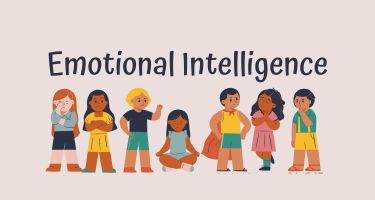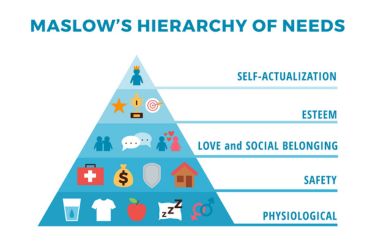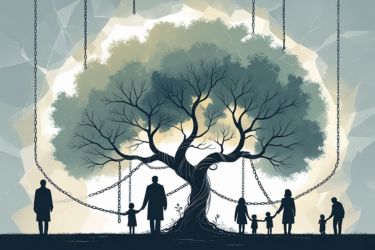Many of us have heard about the midlife crisis, but few really know what it means or when it can happen. It’s a period that often hits people in their forties to early sixties and can bring unexpected changes in mood, goals, and relationships. A midlife crisis is a time of psychological transition that may cause us to question our identity, direction, and achievements.

This phase is not a mental disorder, but it can feel overwhelming as we reflect on our lives and face new challenges. Both men and women can experience these feelings, although it might look different for each person. Understanding why this happens, what signs to look for, and how it may affect our everyday lives can help us manage it better.
Key Takeaways
- Midlife crisis usually happens between ages 40 and 60.
- It affects our thoughts, feelings, and relationships.
- There are ways to cope and find support during this time.
Understanding the Midlife Crisis

People often feel a shift in their thinking, emotions, and goals as they move from youth towards older age. Whether it is questioning career paths, feeling regret, or seeking new excitement, midlife changes affect how we see our place in the world.
What Is a Midlife Crisis?
A midlife crisis usually takes place between ages 40 and 60, but the timing can be different for everyone. It is a time when we re-evaluate our accomplishments, relationships, and future goals as we notice the transition from youth to midlife. Many people experience feelings of restlessness or wonder if they have missed out on important opportunities. We may also face new anxiety about growing older, our health, and our own mortality.
Signs of a midlife crisis can include sudden changes in mood or behaviour, like making impulsive decisions, changing careers, or seeking out risky experiences. There may be a strong need to find meaning or avoid a sense of regret. According to Psychology Today, these feelings often come from long-ignored desires or goals.
Common Misconceptions
Many people believe a midlife crisis only means buying a sports car or having a dramatic lifestyle change. In reality, not everyone has extreme reactions. Most of us go through more subtle changes, such as becoming serious about our health or exploring new hobbies. The idea that every adult in middle age experiences a crisis is not supported by research.
Another myth is that a midlife crisis leads only to negative outcomes. For many people, this period can be a time for growth, letting us discover new interests and make positive life changes. Experts now say it is normal for happiness to dip in midlife and then rise again afterwards, a pattern called the u-shaped happiness curve.
Key Life Stages and Triggers
Triggers for a midlife crisis often include major life events, such as children leaving home, career struggles, divorce, or the death of loved ones. We might also start to compare ourselves to others and worry about how much time we have left to reach our goals. Physical signs of ageing—like changes in strength, energy, or appearance—can add to these feelings.
Life does not move in a straight line. Periods of questioning and reflection are common as we reach certain life stages. Understanding these triggers helps explain why self-reflection and change are so common during midlife. This period can create both uncertainty and the chance for personal renewal.
Key triggers can include:
- Career changes or job loss
- Children moving out
- Turning significant ages (like 40 or 50)
- Health issues
- The loss of parents or close friends
Causes and Risk Factors

Many influences can trigger a midlife crisis. These may include changes in how we view ourselves, natural shifts in our bodies, and the impact of relationships or life changes around us.
Psychological and Emotional Drivers
At midlife, it is common for us to reflect on our achievements, losses, and future goals. Worries about ageing, unmet dreams, or personal regrets can lead to anxiety, stress, and even depression. Some of us may experience fear about our own mortality, which can cause sudden changes in our priorities or lifestyle.
Feelings related to an “empty nest,” when children leave home, often emerge at this stage. Changes in work, such as retirement or job loss, may also amplify uncertainty or doubt. Persistent dissatisfaction or a sense that life lacks meaning are reported by many. According to Psychology Today, facing our own ageing and wanting to “live now” can intensify these emotions.
Many of these feelings, if ignored, can increase our risk for heart disease, worsen depression, or create tension at home and work.
Biological and Hormonal Influences
Biology plays a big role as we age. Hormonal changes in women, such as menopause and perimenopause, can bring symptoms like hot flushes, mood swings, and sleep problems. These can increase stress or anxiety, affecting our mental health.
Some of us may consider hormone therapy to manage these symptoms, but it is important to discuss risks and benefits with a doctor. Men also face hormonal shifts, including lower testosterone levels, which may affect mood, motivation, or energy. Such changes can contribute to a sense of restlessness or sadness at midlife.
Research shows that underlying conditions like heart disease or chronic illness can also play a part, especially if they limit our daily lives or bring worries about the future.
Social and Environmental Factors
Major life events, such as divorce, career changes, or the death of loved ones, can trigger a midlife crisis. Shifts in our social network, especially losing close friends or family, may leave us feeling isolated. A lack of support can make it harder to cope with stress, depression, or anxiety.
Unhealthy habits, including smoking or excessive alcohol use, can raise risk factors for poor health and worsen our emotional wellbeing. Patient.info notes that these habits may make us more likely to experience a midlife crisis.
Expectations we set earlier in life, if unmet, often cause frustration or disappointment. Research shows that recognising these pressures and changing unrealistic goals can help reduce stress. Building a strong support system with friends and family is vital for our mental health during this stage.
Signs and Symptoms

Midlife crisis often brings notable changes in how we act, feel, and even the way our bodies respond. Recognising these signs helps us understand the challenges to our well-being and life satisfaction.
Behavioural Changes
Many of us notice shifts in our daily actions and routines during a midlife crisis. People might become more impulsive or start making sudden decisions that seem out of character. These can include changing careers, buying expensive items without planning, or, for some, trying new hobbies that do not match previous interests.
Some find themselves withdrawing from friends or family, choosing isolation over socialising. Others express restlessness, seeking constant change or excitement. Increased risk-taking can show up, such as reckless driving or picking up unhealthy habits.
Trouble focusing at work or home is also common, often leading to decreased productivity. Patterns in behaviour may shift erratically, making it harder to find satisfaction in what once brought joy. A sense of regret about past decisions may lead us to rethink current choices and the direction of our lives.
Emotional Manifestations
We might experience strong emotions or mood swings that disrupt daily life. Feelings of sadness or sadness and anxiety can appear, sometimes without a clear cause. It's common to feel irritable or lose patience quickly, which can affect relationships.
Nostalgia is another sign, where we dwell on the past or long for earlier times, sometimes feeling regret for things left undone. Our self-confidence and sense of purpose might drop, making us question our achievements and future goals.
Insomnia or trouble sleeping can increase emotional distress. These emotional changes do not only affect us but may also strain our connections with others. If these feelings persist, it could signal depression and influence our overall health and mental well-being.
Physical Symptoms
The midlife crisis is not just emotional. We may notice physical changes as well. Sleep issues like insomnia become more common, and fatigue or low energy often follows. Increased aches, headaches, or stomach problems may occur, even without a medical cause.
Some people develop new health complaints or worry more about their physical condition. Changes in appetite, either eating too much or too little, are possible. Loss of interest in exercise or physical activity may affect long-term health.
Stress can build up, showing in our bodies through muscle tension or high blood pressure. These physical symptoms reflect the connection between emotional struggles and overall health, making it important to watch for patterns that affect our daily lives.
Impact on Personal Life and Relationships

A midlife crisis can disrupt our closest connections, daily routines, and sense of purpose. It often challenges how we see success, happiness, and responsibilities within our families, marriages, and social circles.
Effects on Family Dynamics
When one of us goes through a midlife crisis, our entire family can feel the effects. Parents may question if they're meeting their children's needs or if they've lived up to their own goals. Children notice when routines shift, communication drops, or arguments become more frequent.
- Changes in responsibilities, such as letting go of tasks or taking on new ones, may cause stress.
- There can be more emotional distance between family members.
- Family events, like holidays or school milestones, may be affected by new priorities or mood swings.
These shifts can leave our family unit feeling less stable. It's not uncommon for trust within the family to weaken if the crisis leads us to withdraw or act out. Emotional turmoil during this time can also make it hard to maintain a sense of togetherness.
Consequences for Marital Relationships
Marital relationships are often put under a lot of tension. We may develop doubts about our partner or feel dissatisfied with the relationship itself. This can lead to more arguments or emotional distance.
Some of us might start questioning if we want our relationship to continue in its current form. In some cases, affairs or seeking new relationships may occur. These actions put added strain on our marriage and can sometimes lead to separation or divorce.
Communication becomes even more important. If we do not talk openly, small problems might grow. Guilt, resentment, or confusion may also build up, changing the way we see our spouse and our shared future.
Professional and Social Implications
A midlife crisis can also impact our professional life and social network. Many of us start to question our career choices or feel unfulfilled with our progress at work.
- We may lose focus or motivation, which affects job performance.
- Some consider changing careers or stepping back from work responsibilities.
- Workplace relationships may become strained if mood changes or dissatisfaction show up during work hours.
The social network we rely on may get smaller if we pull away from friends or social events. It's harder to maintain friendships when we feel lost or less happy about our own success.
Adjusting to these changes takes effort. Our sense of happiness may drop if we feel isolated or misunderstood both at work and in our social lives.
Coping Strategies and Support
There are many ways we can manage a midlife crisis, from speaking with professionals to making changes in our daily routines. Finding the right support helps us protect our mental and physical well-being during challenging times.
Seeking Professional Help
During a midlife crisis, working with a therapist or counsellor is often helpful. These professionals are trained to guide us through emotional hurdles, changes in identity, and feelings of uncertainty. Therapy can help us reframe our thoughts, build coping skills, and recognise patterns that hold us back.
Professional guidance offers a safe place to discuss sensitive topics like relationship struggles, career doubts, or regret. Some people might feel nervous about seeking therapy, but it can lead to real growth and more positive thinking. Experienced therapists can also suggest if other treatments or support groups suit our needs.
Sometimes, people consider options such as medication if anxiety or depression is present. Others may think about cosmetic surgery as a way to regain confidence. It is important to discuss these choices openly with a trusted health expert to understand the risks and benefits. For more detailed information, we can visit advice from UK Therapy Guide.
Self-Care and Lifestyle Adjustments
Looking after ourselves is a major part of coping with a midlife crisis. Simple habits like eating nutritious meals, exercising regularly, and getting enough sleep all help maintain overall health. These actions support both our body and mind.
Making time for things we enjoy can also restore balance to our lives. New hobbies, mindfulness, or creative activities often boost our mood and give us a sense of purpose. We should not ignore medical check-ups or symptoms, as keeping an eye on our health helps prevent new worries.
We may also question our roles or routines during this time. Reflecting on our goals and values helps us set new priorities that better fit where we are in life. More strategies for coping with change can be found in this practical guide.
Building a Support Network
Having people to lean on makes a big difference during a stressful period. Talking to family members, close friends, or support groups can reduce feelings of loneliness and bring us comfort. Other people may have gone through a similar experience and can offer valuable advice.
Support networks may include online communities, local clubs, or professional groups. Sharing experiences with others can help us see that our struggles are normal and that growth is possible. It is important to choose people who make us feel heard and respected, rather than judged.
Making connections with others also gives us chances to take part in new activities and build lasting friendships. This ongoing support not only helps us face the current crisis but also protects our overall well-being for the future. We can learn more about support and practical advice at The Spark Counselling blog.
Frequently Asked Questions
We often hear many questions about midlife crises, from what causes them to how to offer help. These answers clarify common concerns so we can better understand and support ourselves and others during this time.
What constitutes a midlife crisis in individuals?
A midlife crisis is a period when a person feels a strong sense of doubt or anxiety about their life, achievements, and future. This may happen during middle age and often leads people to question their choices or feel the need to make changes. It can sometimes be confused with depression or other emotional challenges. For more details, visit this midlife crisis guide.
At what age does a midlife crisis typically manifest?
Most people experience signs of a midlife crisis between ages 40 and 60. However, this can vary depending on personal circumstances and life events. It is not limited to a specific birthday or year, but it does happen at what many see as the "halfway point" in life, as described here about midlife crisis timing.
How can one identify the signs of a midlife crisis in women?
Women may notice changes like increased irritability, lack of motivation, sleep problems, or sudden dissatisfaction with work, relationships, or appearance. Emotional symptoms can be similar to depression, with worry or sadness being common. These signs usually appear alongside questioning life decisions or goals. For more, see typical signs of a midlife crisis.
What are the primary triggers that lead to a midlife crisis?
Triggers often include big life changes such as children leaving home, career shifts, health problems, or experiencing loss. These events can make people feel uncertain about their direction in life, leading them to reflect deeply and re-examine their choices. Read more about common midlife triggers.
How does one effectively support someone experiencing a midlife crisis?
Being patient and non-judgemental is essential. Encourage open conversations without pressure and offer support even if we do not have all the answers. Suggesting professional guidance may help if the person feels overwhelmed or depressed. Learn how to support others through this period at this therapy guide for midlife crisis.
Can you outline the stages commonly associated with a midlife crisis?
The process may include several stages: first, questioning life choices, then feeling emotional distress or dissatisfaction. This stage can be followed by seeking new meaning or making lifestyle changes. It often ends with acceptance and integration of new goals or routines. Details on stages can be found in this discussion of midlife questions and steps.





















